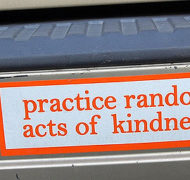Faith in the Workplace: Not-So-Random Acts of Kindness (Genesis 39 and Galatians 5 Sermon Notes)
Sermon Notes / Produced by The High Calling
Genesis 39:20-23
20 Joseph’s master took him and put him in prison, the place where the king’s prisoners were confined. But while Joseph was there in the prison, 21 the LORD WAS WITH HIM; HE SHOWED HIM kindness and granted him favor in the eyes of the prison warden. 22 So the warden put Joseph in charge of all those held in the prison, and he was made responsible for all that was done there. 23 The warden paid no attention to anything under Joseph’s care, because the LORD WAS WITH JOSEPH AND GAVE HIM SUCCESS IN WHATEVER HE DID.
Galatians 5:19-26
19 The acts of the flesh are obvious: sexual immorality, impurity and debauchery; 20 idolatry and witchcraft; hatred, discord, jealousy, fits of rage, selfish ambition, dissensions, factions 21 and envy; drunkenness, orgies, and the like. I warn you, as I did before, that those who live like this will not inherit the kingdom of God. 22 But the fruit of the Spirit is love, joy, peace, forbearance, kindness, goodness, faithfulness, 23 gentleness and selfcontrol. Against such things there is no law. 24 Those who belong to Christ Jesus have crucified the flesh with its
passions and desires. 25 Since we live by the Spirit, let us keep in step with the Spirit. 26 Let us not become conceited, provoking and envying each other.
Theological Point: Throughout Scripture, kindness is an attribute of the character of God which we are called to emulate. The Hebrew word hesed is often translated as kindness, though it has a richer dimension than the English word, carrying with it a deep sense of abiding loyalty and steadfastness. [1] The Greek christotes is often translated as kindness as in our New Testament reading on the fruit of the Spirit, as well as in Romans 2:4, 3:12, 11:22, Titus 3:4, and Ephesians 2:7 [To the preacher: if you have time, look up these passages to see the wonderful depth of this attribute of God]. Gerhard Kittel argues, “When Paul commends christotes to Christians in the lists of virtues in his epistles, we do not interpret either this word or the related virtues enumerated with it correctly if we simply regard them as formulae taken from the Cynic-Stoic tradition and having a general humanitarian content. In them the apostle is in fact expressing the great experience that God’s love which is revealed in Christ and shed abroad in the hearts of His people by the Spirit works itself out in them as christotes towards their neighbours” (Theological Dictionary of the NewTestament, V. IX, page 491).
Hermeneutical Connection: God shows us kindness manifested in the ways described in Scripture, and we are called then to be an agent of God’s kindness in the world, exhibiting the richness of God’s grace and presence to those around us. Kindness in Scripture implies a sustained relationship; the workplace is just such a place for this kind of kindness.
Introduction: The preacher might consider recognizing the bumper stickers that used to be prevalent on cars a few years ago: “Practice Random Acts of Kindness.” (The stickers caught on, eventually leading to the formation of the Random Acts of Kindness Foundation in 1995 which promotes doing kind deeds. There are many stories on the Foundation’s website of people who, by exercising kindness, have made this world a better place. Also, some preachers like to start a sermon off with something light, even humorous. Look at http://failblog.cheezburger.com/wins/tag/random-acts-of-kindness. Especially notice the paper taped to a pole in Central Park thanking a stranger for turning in his wallet to the police. Or, my favorite, notice the Magic Kingdom security guard requesting the autograph from a “princess” and making her day.
Transition from the Introduction: Christians, of all people, should exude kindness. It ought to be something that brims in our lives and spills out to the world around us. Our kindness is an outpouring of God’s gracious activity in the world, and a living gratitude of all God has done in our lives to redeem, restore and renew us.
A. Random Acts Alone?
The kindness of God in the Hebrew Scriptures is a kind of loyalty and love that spans generations to draw humanity back to the Lord. It is a steadfast love that endures, is patient, and acts to redeem and restore. [See footnote 1 for ways hesed is used throughout the Hebrew Scriptures]. In the Joseph narrative, Joseph exercises this kind of kindness to his master Potiphar by being loyal to him. Kindness or steadfast love is shown in acts of loyalty and steadfastness.
Similarly, in our New Testament reading, Paul identifies kindness as a fruit of the Spirit. Notice the dialectic that Paul introduces. One the one hand, we can live as a people who are immoral, disloyal, argumentative, envious and addicted; or, we can instead develop our relationship with Christ and show forth the fruit of the Spirit: love, joy, peace, forbearance, kindness, goodness, faithfulness, gentleness and self-control. These are the signs that we belong to the Lord and are children of the living God! We exhibit kindness by the very nature of being recipients of such kindness ourselves from God.
Illustration. There is no doubt that practicing random acts of kindness helps make the world a better place to be. Tell one here. Here is one of mine:
I was sitting at a café in the San Francisco airport because my flight to Boston had been delayed. The establishment was the kind where you place your order, pay for it and then it is brought to you by a waiter. I was sitting at the counter and noticed a US serviceman ordering and paying for his meal, and then taking a seat at a table waiting for it to come. I called over his waiter and asked if he could reverse the charges for the meal on the serviceman’s credit card so that I could then pay for his meal instead. He agreed. I also asked the waiter not to tell the serviceman that it was me who paid for his meal. I carefully watched, though, as the waiter told the serviceman that his meal had been paid for, and the surprised look on the serviceman’s face.
But I didn’t expect what followed. Both the waiter and another waiter approached me and told me that the two of them had paid for my meal. I said it wasn’t necessary, but they insisted. And then they continued to compliment me for the simple act of kindness I had done. I stopped them and said, “Hey, thank you, but it’s a small thing! You guys are gushing too much! Why are you doing this? Is it because you have a friend or family member in the military?”
“No, man,” one of them replied, “it’s just…you don’t see this very often. You are sharing The Love; you are sharing The Love!”
Such random of acts of kindness are fun to do, and they make a difference in the world, and, in this case, the love kept on going! But the love of God is more than occasional acts by a random God; rather, the steadfast kindness of God is a determination to be present in our world to redeem and restore. Random acts of kindness are great; but dedicated acts of kindness over time are even greater.
B. A Kind God and a Kindred People
Turning now from Hebrew and Greek to English, I discovered something interesting about the English word, kindness. Kindness is related to the word kind and also kindred. In its earliest usage, kindness was the kind of loyalty and affection you had for people of your own kind. These words were related to family and tribe. You showed kindness to those you were in regular contact with, who were of your own family heritage.
We are children of God, and we are called to feel a connection to all of God’s creation and God’s people. The kindness of God, once expressed within the province of the tribe of Israel, has, in Jesus Christ, now gone global! We are to show forth God’s kindness to our own kind – meaning the whole of the human race whom God has made and whom God adores (John 3:16). The Gospel now, according to the command of Jesus, is to go forth from Jerusalem, Judea, Samaria and to the ends of the earth.
Illustration. There’s a story that went around years ago attributed to the well-known preacher and professor of preaching, Fred Craddock. While the story has evolved into various ideations, none contests that Craddock actually told the story and on more than one occasion. Some of these accounts say the story happened to him (he was the seminary professor). Regardless, Craddock’s telling of the story gives it some credibility. Additionally, the story of Gov. Ben Hooper’s life would confirm it at least circumstantially cf. “The Unwanted
Boy,” an autobiography by Ben Hooper. A discussion of the story’s history and the story itself can be found at: http://reformedanglican.blogspot.com/2007/05/whos-your-daddy-urban-legend-or.html. The point of the story: we are all related by a common Creator, we are all children of God, and we are now called to live in a state of kindness to our kindred, both within and outside the Church.
C. The Kindred at Work
This sermon can be applied in many ways, and in many spheres of life, and I’m hoping that God is tugging on the sleeve of your mind about ways you can intentionally show kindness wherever you go. However, today I am especially addressing kindness in the workplace.
There is considerable evidence to show that the workplace is prone to unhealthy levels of stress, hostile relationships, and group dysfunction. (See, for example, http://www.stress.org/workplace-stress/. ) We spend a lot of time at the workplace – as much as a third of our lives! – and the people we work with are a kind of kindred or tribe in which God has placed us. As Christians we ask, how can I show the kindness of God at the workplace? As one who is maturing in faith in the Lord, am I bearing the fruit of my relationship to God at work? Do I even think that is important to do?
[Preacher, here you might want to address some of the reservations in the pews]. Look, it isn’t that hard to practice our faith on Sunday mornings at church…but what about the rest of the week? Imagine if we took what we believe into our unique spheres of life, and spilled out the kindness of God there?]
In my life, I often find this to be a mindset: am I thinking about ways to show kindness at work? Am I looking for opportunities to go out of my way to be helpful? The workplace is an ideal place to show what we’ve described as hesed because it is not a random hit and then we’re gone – it is showing the kindness of God on a regular basis. I believe that if we start this tomorrow morning at work, and stay with it, our workplaces will be changed around us – all because we intentionally decide to invest ourselves in the lives of people around us with kindness.
Now, kindness is not weakness, it is the strength of being helpful, of surprising another with a gift of an extra effort or serendipity of grace. Try doing this even with someone you don’t like at work.
Illustration (Think of your own. Here is one of mine).
It snowed hard last week in Massachusetts – more than three feet in a day. The real problem came when the city plows went up and down the streets because they plow in the driveway. The snow they push into our driveways becomes denser and more gravel-y than the snow that falls from the sky. I got my snow blower out and labored through the plowed up snow at the end of my driveway…and then I snow blew the end of the driveway of a neighbor who I knew was ill and would be unable to do it himself…and then…I snow blew the end of the driveway of a neighbor across the street whom I do not like at all. My wife said she understood why I cleared the driveway of the ill neighbor, but why that of the fellow across the street whom neither one of us likes? “Because of what Jesus said,” I replied. “If you love those who love you, what credit is that to you? Even sinners love those who love them. And if you do good to those who are good to you, what credit is that to you? Even sinners do that.”
It’s the same at work. If we show kindness to those we don’t like, even despise, then what might God through our extensions of his grace?
[Want some examples of sustained kindness in the workplace? Consider these:
Restoring Homes to Restore a Community
Small Celebrations in a Super-Sized Workplace
Invitation to a Modest Moral Inventory
The Secret to Productivity & Happiness at Work
Five Ways to Start a Kindness Revolution at Work
Conclusion
[To the preacher: showing vulnerability from the pulpit can result in opening up others to their own need for change and growth. How are you serving with God’s kindness in the workplace of your church? I have, at times, been terrible at this. In fact, I believe my first great failure in ministry – and I have had others – is the management of people. In my own conclusion to this sermon, I might say something like: “Look. I’m not just preaching to you today. I’m convicted by my own sermon. I want to be better at this. Will you join me in making our workplaces and living places more reflective of the kindness of Jesus?”]
Imagine this with me. All of us – you and me together – leaving here and doing random and not-so-random acts of God’s kindness in our workplace. I wonder if we can change a little slice of our not-so-kind world with the simple, sustaining kindnesses of God. Imagine every Christian today moving through their lives watching for opportunities to exercise the kindness of God – and how would our town be different if just we, in this room, decided to live that way intentionally?
[At this point, if appropriate, you might consider asking your congregation to give you feedback of what happened when your members acted kindly in the workplace. Then, share those stories – or have your members share them – in worship the next week or in the newsletter or on a video.]
*********************************************************************************************************
Dr. George Cladis, Executive Pastor, Liberty Churches, Shrewsbury, MA; Executive Operating Officer, New England Dream Center, Worcester, MA







